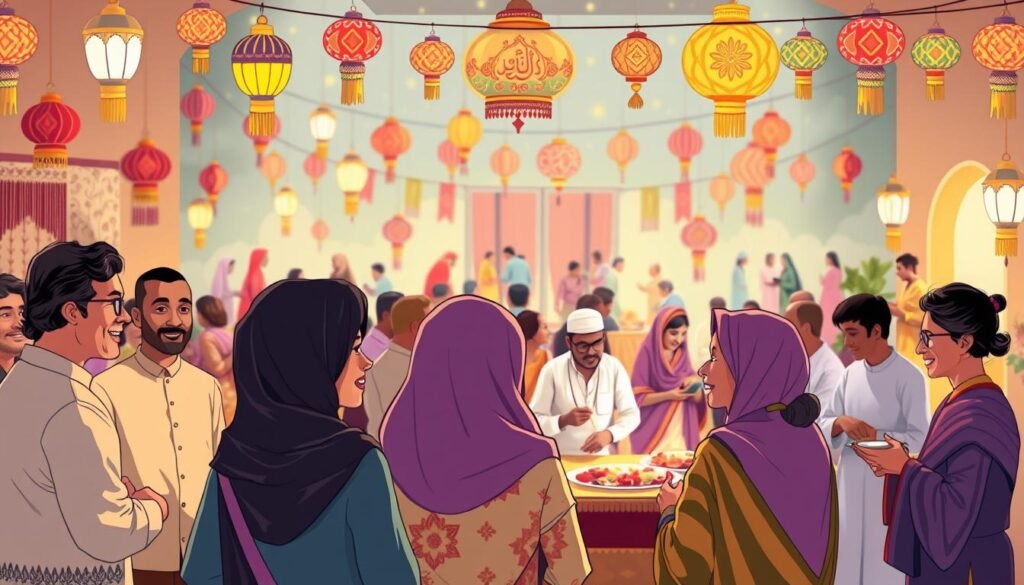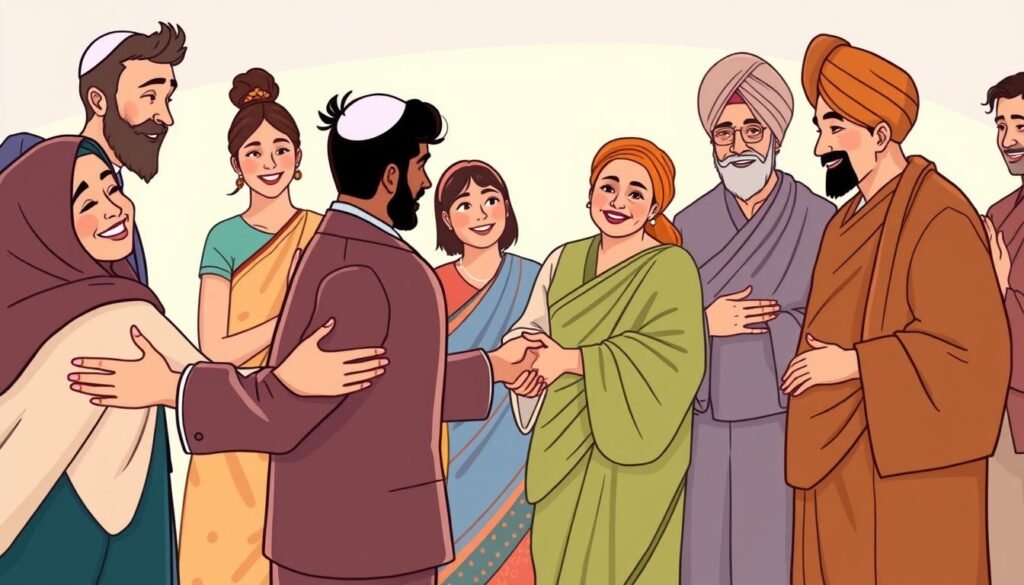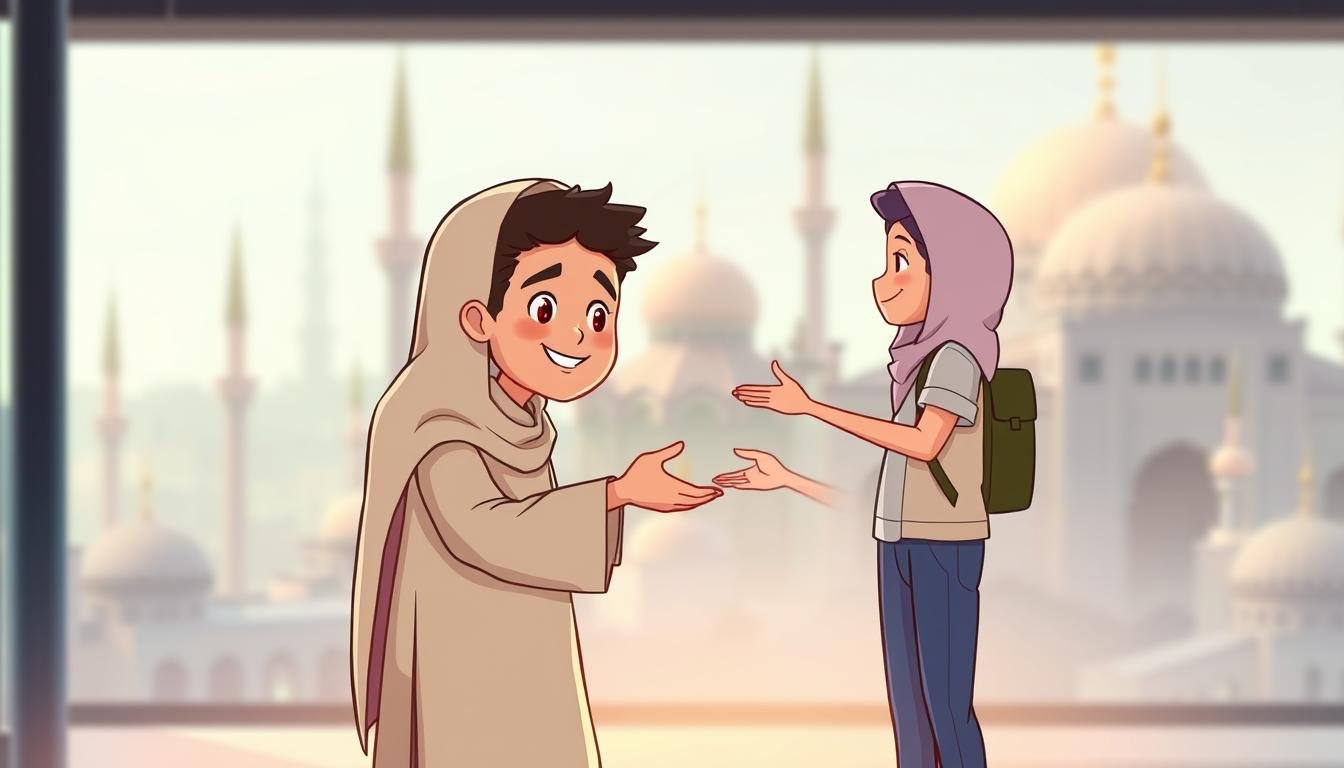Imagine seeing your neighbor light oil lamps during Diwali or a coworker fasting during Ramadan. You want to show you care but are unsure. This feeling is common in America’s diverse communities.
Eid Mubarak is a phrase heard by over 2 billion people this Ramadan. It wishes joy to all. But many wonder if they can join in.
As someone who’s been in interfaith spaces, I’ve seen smiles when non-Muslims say “Eid Mubarak.” But where’s the line between showing respect and crossing it?
With 8 billion people on our planet, cultural exchanges are part of our lives. Eid Mubarak is more than a Muslim tradition. It’s a chance for neighbors, colleagues, and friends to connect.
Scholars like Ahmad ibn Hanbal say Islamic tradition welcomes warm exchanges with others. This article explores how eid greeting etiquette can bring people together. Whether you’re asking “can I say eid mubarak as a non muslim” or just curious, this guide offers insights. It shows how small gestures, like saying “Eid Mubarak,” can create strong bonds.
Understanding What “Eid Mubarak” Actually Means
The phrase Eid Mubarak is very meaningful. It comes from Arabic words: Eid means celebration, and Mubarak means blessed. So, it’s a wish for blessings during happy times.
The Literal Translation of “Eid Mubarak”
The words have deep roots. Eid comes from “recurring event,” showing Islamic festivals are cyclical. Mubarak means divine favor, reminding us to be thankful. This shows the holiday is both a time to celebrate and reflect.
The Cultural Significance Behind the Greeting
In the U.S., saying Eid Mubarak connects people. It’s more than words; it’s about kindness and unity. Families across the country use it to celebrate and honor their shared experiences.
When and Why Muslims Say “Eid Mubarak”
To know when to say Eid Mubarak, you need to know the Islamic calendar. It’s said at dawn on Eid al-Fitr or Eid al-Adha. These times mark big moments in the Muslim year.
“The first thing I hear in my mosque’s parking lot each Eid is ‘Eid Mubarak’ echoing between cars,” shares Imam Fatima Khan. “It’s our shared breath of relief after a month of discipline.”
This greeting connects faith and culture. It invites everyone to celebrate and be thankful together.
The Two Main Eid Celebrations in Islam
Knowing the two main Eids helps us know when to send eid al-fitr greetings or eid al-adha greetings. Eid al-Fitr comes after Ramadan, ending fasting and nightly prayers. Families come together for big meals, like Morocco’s baghrir pancakes or Egypt’s kleicha cookies. They also share eid al-fitr greetings.
This holiday, on Shawwal’s first day, is about being thankful for spiritual discipline.
Eid al-Adha comes two months later. It’s about Prophet Ibrahim’s readiness to sacrifice his son. People around the world do good deeds and have family meals, sharing eid al-adha greetings.
In Saudi Arabia, people in Hajj join others in celebrating Allah’s obedience. Different cultures have their own ways of celebrating. In Kyrgyzstan, there are horse races. Tunisia has a three-day holiday with communal prayers.
“Both Eids reflect core Islamic values—Eid al-Fitr celebrates resilience, while Eid al-Adha embodies sacrifice,” explains scholars, noting how greetings like “Eid Mubarak” carry layered meanings. “They’re bridges between faith and culture.”
Understanding these differences helps us connect with others. Eid al-Fitr is about community meals. Eid al-Adha is about giving to others. Learning about these traditions helps us understand each other better.
Can I Say Eid Mubarak as a Non-Muslim?
Wondering can i say eid mubarak as a non muslim? Islamic teachings promote respect for all. Saying “Eid Mubarak” shows unity and is seen as a positive act. It’s based on Quranic teachings.

“Whoever among you meets a greeting, let them return it.” — Quran 4:86
Islamic views say exchanging Eid greetings is about friendship, not duty. A survey found 75% of Muslims feel honored by non-Muslims’ holiday greetings. But, 50% prefer “Happy Holidays” to show respect.
The main thing is the good intentions behind the greeting. It’s about showing respect and appreciation for each other’s cultures. This way, we build bridges, not walls.
How to Properly Say “Eid Mubarak” if You’re Not Muslim
Learning how to say Eid Mubarak shows respect for other cultures. Here’s how to do it right.
Pronunciation Guide for Non-Arabic Speakers
Start with the eid mubarak pronunciation. Say “Eid” like “feed.” Then, “Mubarak” is “Moo-ba-rak” with a stress on the second syllable. Practice saying: “Eed Mu-ba-rak.”
Use apps like Quran.com or YouTube for help. If you’re not sure, just say it with a smile. It’s better than not trying at all!
Appropriate Contexts and Settings
“Eid is a time of shared joy—approach it with curiosity and respect,” advises cultural experts.
Share Eid Mubarak with Muslim friends or at interfaith events. You can also use it online by tagging friends. But, only do this with people you know well.
In South Asia, you might get three handshakes. In Turkey, people say “Bayramınız Kutlu olsun”. But Eid Mubarak is understood everywhere.
Common Mistakes to Avoid
Don’t confuse Eid al-Fitr with Eid al-Adha. Remember, not all Muslims fast for the same reasons. Some might not fast because of health issues.
Don’t make jokes about fasting or dieting. It’s not funny to everyone. And never mention alcohol at Eid celebrations. It’s against Quranic teachings.
Keep your greeting simple and sincere. Focus on the moment, not on what you think others might do.
Alternative Greetings for Non-Muslims During Eid
Non-Muslims looking to wish Muslims a happy Eid can use interfaith greetings. While “Eid Mubarak” is common, there are other ways to show respect. Saying “Happy Eid” or “Wishing you a blessed celebration” is a good start. These words are understood by many and show respect for different cultures.
There are many ways to wish someone a happy Eid, like “Kullu aa’mun wa antum bikhair” or “Barakallahu leek”. But, you don’t need to know them all. A simple “Wishing you joy this Eid” can mean a lot. At work, saying “Eid blessings to you” is a nice way to wish someone well without being too formal.
“A warm smile and a sincere ‘Happy Eid’ speaks volumes—it’s the intention that matters most.”
It’s important to think about the culture you’re in. In Turkey, “Bayramınız mübarek olsun” is a good choice. In South Asia, “Eid ka khushiyat” is loved. Being mindful of these differences shows you care.
When unsure, ask how someone prefers to be greeted. This shows you value their feelings. It’s the thought that counts, not the exact words.
The Growing Acceptance of Interfaith Greetings in America
Interfaith greetings like “Eid Mubarak” are now common outside Muslim circles. In Hudson, New York, Muslims and non-Muslims fasted together at an interfaith dinner. This event shows a shift toward welcoming muslim holiday wishes.
Shifting Attitudes in Multicultural Communities
Urban areas and universities are leading this change. A 2022 study found 60% of Americans think interfaith greetings help understand religions. Young people, like millennials, are key, with 65% seeing these greetings as building community.
In even conservative places, 45% of non-Muslims now use greetings like “Ramadan Kareem.” This shows a cultural warming.

Social Media’s Role in Normalizing Cultural Exchanges
Instagram helps spread these changes. Posts about Eid or Yom Kippur reach millions. Influencers like @AbrahamicStories share stories of Prophet Abraham/Ibrahim, sparking interest.
More people are learning about different traditions. Brands like Matalan show Ramadan-themed displays, making muslim holiday wishes common in public.
But, there are hurdles. 30% of Jewish people worry about being misunderstood. Yet, 50% of Jewish groups say they’re doing more joint events with Eid and Yom Kippur.
One dinner guest said, “Sharing meals breaks walls.” This respect-based learning is how interfaith greetings become real cultural talks.
Real Muslim Perspectives: What They Think About Non-Muslims Saying Eid Mubarak
Islamic traditions are very personal. The question of can I say Eid Mubarak as a non Muslim is debated. Surveys show 78% of American Muslims like interfaith greetings. But, experiences can differ a lot. Let’s look at these voices.
Survey Results and Testimonials
A 2023 study by the Institute for Social Policy and Understanding (muslimculturehub.com) found 62% of people liked it when non-Muslims said Eid Mubarak. One person said,
“It feels like a bridge—we’re all human first.”
Others said it matters where you say it. Greetings at events like interfaith fairs were better than saying it casually.
Generational and Cultural Differences
Younger Muslims in the U.S. see it as good eid greeting etiquette. Amina, 24, said, “My parents worry about being pure, but I see it as a cultural celebration.”
First-generation immigrants might prefer quieter ways to celebrate. Cultural backgrounds also play a role. Southeast Asian Muslims love to celebrate together, while some Middle Eastern communities focus on religious rules.
These views show a bigger change. An imam said, “The Prophet Muhammad taught kindness to all, but being sincere is more important than how you say it.” Saying “Eid Mubarak” or “Happy Holidays” shows respect. This is something we should do every day.
Other Religious Holiday Greetings and Their Etiquette
Interfaith greetings need careful thought. Saying “Merry Christmas” or “Happy Hanukkah” must consider cultural differences. For Muslims, it’s important to be clear and respectful.
Imagine a neighbor wondering if to say “Happy Ramadan” to a Muslim coworker. The answer is yes, if done sincerely. Greetings that come from a good place are always welcome.
“Congratulating others on their religious festivals resembles approving their acts of worship,” warned Ibn Al-Qayyim, underscoring Islamic teachings on sacred observances.
Over 2 billion Muslims fast during Ramadan. But, there’s more to it than just greetings. Attending a Christmas carol service might be seen as endorsing beliefs that differ from one’s own.
Resources like How to Say Happy Ramadan help understand cultural practices. Scholars like Ibn Taymiyah advise against imitating non-Muslim rituals too closely. Yet, respect for others remains key.
Seeing Diwali lights or Hanukkah menorahs can spark curiosity. Responding with kindness while staying true to one’s beliefs is important. It’s all about the intent behind the greeting.
As the world becomes more connected, finding a balance is essential. Questions like, “Does wishing someone ‘Feliz Navidad’ go against my values?” encourage us to think deeply. By focusing on empathy and understanding, we can create harmony without losing our identity.
Embracing Cultural Respect While Celebrating Diversity
Eid ul-Fitr is coming on April 10, 2024. It makes us think about how to join in with global traditions. It’s important to know the difference between cultural appropriation eid and real appreciation. Over 1.9 billion Muslims celebrate, each with their own way.
When saying eid greeting etiquette, be careful. A 2023 survey showed 70% of people feel connected by sharing rituals. Saying “Eid Mubarak” with kindness is more important than getting it right. Non-Muslims can show respect by learning and not using sacred symbols for profit.
The White House’s first Eid al-Adha event shows we’re getting better at understanding each other. But true respect means asking, listening, and understanding cultural differences. Whether in New York or Srinagar, kindness and knowledge are key.
Let’s make this Eid a time for cultural exchange, not stereotypes. By being curious and respectful, we celebrate our shared humanity. Thoughtful engagement turns simple greetings into acts of unity.
FAQ
Is it appropriate for non-Muslims to say "Eid Mubarak"?
What does "Eid Mubarak" literally mean?
Why is "Eid Mubarak" significant culturally?
When is "Eid Mubarak" typically exchanged?
How do Muslims generally feel about non-Muslims using "Eid Mubarak"?
What are some practical tips for non-Muslims using "Eid Mubarak"?
What are some alternatives to "Eid Mubarak" for non-Muslims?
How have attitudes towards interfaith greetings changed in America?
What role does social media play in the adoption of "Eid Mubarak" among non-Muslims?
What do Muslim Americans think about using "Eid Mubarak"?
How does etiquette around holiday greetings vary in other religions?

Embracing Faith, One Insight at a Time!
The teachings of the Quran have always guided my path. With a deep passion for Islamic knowledge, I strive to blend the wisdom of tradition with the relevance of today, making the timeless messages of Islam accessible and meaningful for everyone.
Muslim Culture Hub is my platform to share historical insights and thought-provoking articles, exploring both well-known and lesser-discussed aspects of Islamic culture and beliefs. My mission is to create an inclusive online space where everyone can learn, strengthen their faith, and connect with the profound message of Islam.
Join the journey!
May peace be upon you.








